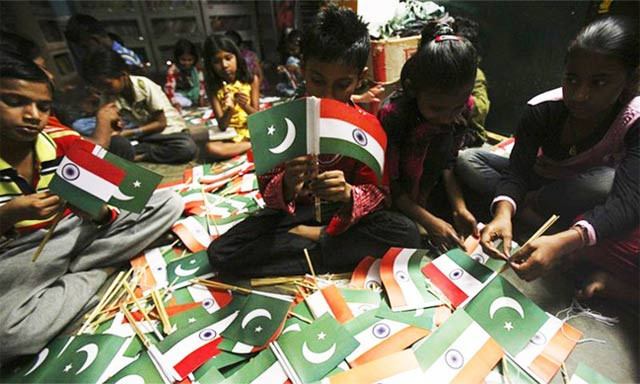Are we destined to be enemies?
One of the foremost foreign policy challenges for Pakistan has been managing its relations with India

One of the foremost foreign policy challenges for Pakistan has been managing its relations with India. PHOTO: REUTERS
Fortunately, Pakistan has been successful in resisting the pressure, as it is inconceivable for the people to be subservient to India. It will cut against the very foundational ethos of Pakistan.
In addition, Islamabad draws strength from its strategic relations with China and dependable allies such as Turkey and Saudi Arabia. Lately, Islamabad has been expanding its relations with Moscow, trying to remove Tehran’s misgivings and cultivating friends in Central Asia to expand its regional links.
There is a general consensus within the country that India’s aggressive policy is a means to subdue the voice of Pakistan in its support for the genuine struggle of the people of Kashmir. Kashmiri youth leader Burhan Wani’s death and the continuous extrajudicial killings that have triggered a mass movement and outrage in Kashmir have found resonance and sympathy in Pakistan.
More significantly, Pakistan realises the significance of maintaining a strong conventional force superimposed by a nuclear dimension to maintain a balance against India’s expanding military capability. Developing a significant conventional capability and minimum credible deterrence has been possible only by diverting substantial national resources. For this the people continue to make huge sacrifices as substantial fiscal resources are allocated year after year for the defence- and security- related budget.
India and the US are both opposed to Pakistan’s expanding strategic partnership with China. They are bitterly against the China-Pakistan Economic Corridor (CPEC) and are likely to create hurdles in its implementation. Although there are indications that United States has softened its position towards the corridor, Indian hostility stems from its unwillingness to cede strategic space and economic benefits that would accrue to China and Pakistan from the successful implementation of the project. To create impediments, India is supporting the Baloch nationalist movement monetarily as well as politically.
Despite domestic opposition from influential quarters, Pakistan has been seeking normalisation of relations with India. Fortunately, there is unanimity among major political parties for improving relations. Because there is a realisation that the future of Pakistan and of South Asia lies in a cooperative relationship between countries. Moreover, willingness to engage with an intransigent Indian leadership is not submission to New Delhi’s dictates but is a reflection of Pakistan’s mature approach towards it. No one expects Pakistan’s forward-looking approach would lead to any resolution of the disputes but at least it may contribute in easing tensions. More significantly, keeping channels of communication open with India acquires greater significance in the light of constant flare-up on the Line of Control.
Nuclear powers with contiguous borders cannot afford to remain in such a high level of hostility without communicating with each other. There are clear dangers associated from the current revolt of the people of occupied Kashmir that are being ruthlessly suppressed. In order to divert international attention from the Kashmiri uprising, Indian authorities are pursuing policies that are making matters worse. A future terrorist attack in India from the Kashmir related groups or by any other militant organisation could be conveniently labelled for being sponsored by Pakistan. This could lead to serious consequences. Besides, Modi’s militaristic approach towards Kashmir and hostility towards Pakistan provides encouragement to militant groups.
India has very naively committed itself to launch “surgical strikes” and limited military operations as a part of its Cold Start doctrine. A strong retaliatory response by Modi’s government in the event of an incident in India is a dangerous scenario. It is possible that some militant organisations may deliberately create a confrontational situation by initiating a terrorist attack.
We also have to bear in mind that asymmetry between India and Pakistan at the conventional level could result in escalating the conflict in a relatively short period to the nuclear threshold.
The role of the US during an India-Pakistan conflict though undefined is likely to lean in favour of India. It could take the form of cooperating closely at the intelligence level or may result in destroying our delivery systems, be it aircraft or missiles.
The Indian government and media have been reiterating that they are the victims of terrorism emanating from Pakistan. But if an honest appraisal was done, it would be clear that Pakistan had far greater number of terrorist attacks and casualties as compared to India. By adopting this approach they want to belittle our efforts and sacrifices and deflect focus from their shortcomings in Kashmir. The international community is gradually realising that New Delhi’s narrative lacks credibility.
A more honest and productive approach for India would have been to cooperate and work together to eliminate the scourge of terrorism.
At a time when the world is faced with enormous geopolitical challenges and each of the South Asian countries are struggling to break the shackles of poverty and ignorance cooperation and not confrontation between India and Pakistan should have taken priority. New Delhi’s current policy against Pakistan has not succeeded in the past and unlikely to bear fruit in future. Neither has Pakistan’s policy of giving support to some militant groups worked to its advantage. It is time the two countries moved away from domination by security considerations and engaged in dialogue to find an amicable solution of Kashmir and other issues. This would not be a sign of weakness or desperation but a way forward toward how countries resolve their differences in the best interest of their people.
Published in The Express Tribune, November 22nd, 2017.
Like Opinion & Editorial on Facebook, follow @ETOpEd on Twitter to receive all updates on all our daily pieces.














COMMENTS
Comments are moderated and generally will be posted if they are on-topic and not abusive.
For more information, please see our Comments FAQ